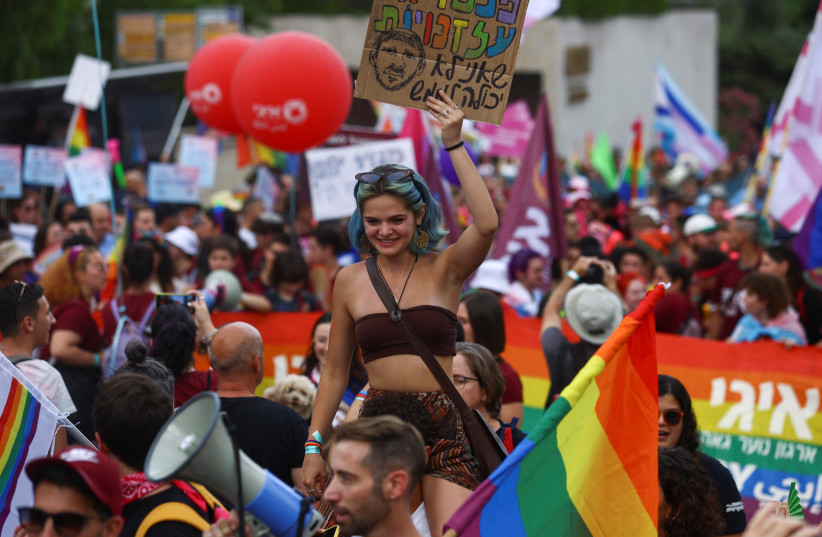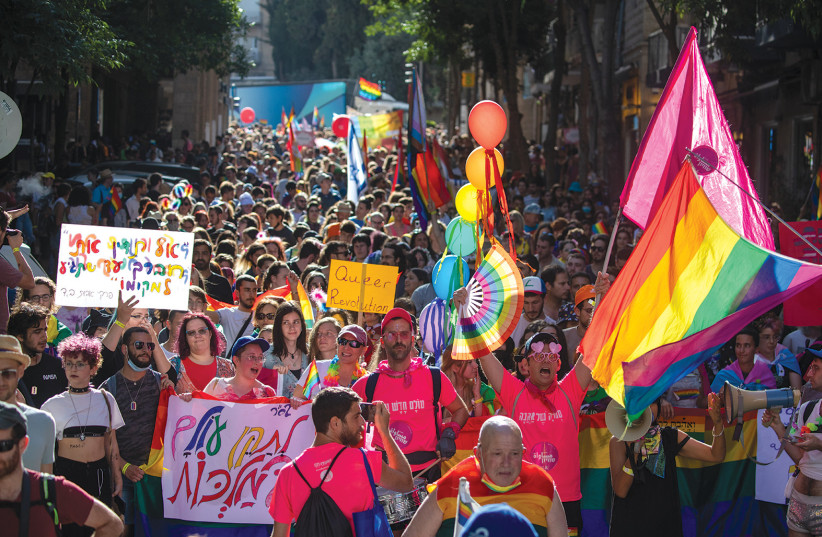Pride, especially now – opinion
The first time I marched in the Jerusalem March for Pride and Tolerance was the day Shira Banki was murdered.
I hadn’t intended to participate in the event at all. I was on my way to a wedding at a hotel overlooking the Old City when reports started coming in of casualties in an attack at the march. It soon emerged that a 16-year-old girl – Shira, who had been marching in support of her LGBT friends – had been stabbed to death by a man who had burst into the crowd and started attacking marchers.
Suddenly, I felt a need to be there. I made my way through central Jerusalem to Liberty Bell Park and joined the marchers, many of whom were stunned and crying but nevertheless determined to complete the march. I walked the full route, sweating in a dark suit, before continuing on to the wedding.
I’ve tried not to miss a march since that awful day in 2015; this year, unfortunately, I won’t be there. Since I’m writing this before the march takes place, I can only hope and pray that it will have proceeded peacefully and that none of the participants will have been harmed.
Increasingly ominous skies for LGBT community
 Israelis march in Jerusalem during the pride march on June 1, 2023 (credit: REUTERS/Ronen Zvulun)
Israelis march in Jerusalem during the pride march on June 1, 2023 (credit: REUTERS/Ronen Zvulun)THIS YEAR’S march, however, takes place under increasingly ominous skies for Israel’s LGBT community.
Earlier this week, Channel 12 reported that a Telegram chat maintained by the racist and anti-LGBT group Lehava has been flooded with messages threatening violence at this year’s march. “Deadly Thursday,” wrote one activist, sharing a flier advertising a counterprotest. “Why not burn all the gentiles coming to defile our land?” asked another.
The individual responsible for ensuring marchers’ safety, National Security Minister Itamar Ben-Gvir, is the very same individual who – along with fellow far-right activist and present-day Finance Minister Bezalel Smotrich and Lehava founder Bentzi Gopstein – previously organized “beast marches” featuring dogs, goats and donkeys in protest of the Jerusalem pride march. “At least these beasts haven’t sinned,” he told the media in 2006 (not to be outdone, Smotrich said that the Pride March “is worse than bestiality – they’re a bunch of deviants”).
Earlier this week, Ben-Gvir rejected pleas by the march’s organizers that he step aside and that Prime Minister Benjamin Netanyahu oversees the police’s preparations for the event, assuring them that he wouldn’t permit participants to be harmed.
Also earlier in the week, the government welcomed back Avi Maoz as a deputy minister in the Prime Minister’s Office, responsible for overseeing the newly created National Jewish Identity Authority. Maoz, who heads the far-right Noam Party and is its sole representative in the Knesset, is one of Israel’s most prominent and unabashed homophobes. He has consistently railed against the LGBT community and has rejected equal rights for its members. He has compared same-sex attraction to pedophilia, opposed surrogacy and civil unions for same-sex couples, and termed the Jerusalem Pride March “a public march of whorish abomination.” Maoz’s National Jewish Identity Authority, which will be funded to the tune of NIS 285 million over the next two years, will reportedly be tasked with “strengthening Jewish identity” by, among other things, conducting an audit of after-school programs and ensuring “transparency” on their contents.
WHAT MAKES all this even worse is that a majority of the government voted in favor of Maoz’s appointment – with the prime minister’s blessing. This may not come as a great surprise considering the current government’s composition.
Ben-Gvir’s efforts against both the Pride March and LGBT rights more broadly are well known. Smotrich once declared himself “a proud homophobe.”
The haredi parties, on which Netanyahu relies to maintain his ruling majority, consistently vote against legislation to protect and advance LGBT rights; Member of Knesset Yitzhak Pindrus of United Torah Judaism, who previously served as a deputy mayor of Jerusalem, tried to hold a “donkey march” of his own alongside the 2010 Pride March, saying, “There are donkeys who are proud of their donkeyness and want to conduct a march.”
 JERUSALEM’S 21st Pride Parade will take place on June 1. (credit: OLIVIER FITOUSSI/FLASH90)
JERUSALEM’S 21st Pride Parade will take place on June 1. (credit: OLIVIER FITOUSSI/FLASH90)It is worth noting the difference between the Jerusalem Pride March and the pride parade in Tel Aviv. The latter, which generally takes place a week after the Jerusalem event, is a massive street party featuring hundreds of thousands of parade-goers dancing joyously – and in various states of undress – to rhythmic music as they make their way along Tel Aviv’s golden beaches. It is fun, colorful and celebratory.
The Jerusalem event, on the other hand, is a protest march in every respect. Participants – including thousands of teenagers and many members of Jerusalem’s religious Zionist community – wave flags and carry signs calling for equal rights for the LGBT community. It is an event that is respectful of the city’s character: restrained yet determined.
SEVERAL YEARS ago, I found myself in a taxi from the airport to Jerusalem in the hours leading up to the Pride March, having flown home especially to participate in the event. The driver was listening to the traffic report, which was telling motorists to anticipate road closures in the center of the city due to the march, and he muttered something about keeping “those things” in Tel Aviv.
“But there are LGBT people in Jerusalem, too,” I said. “Don’t they deserve equal rights?”
“Well, rights, yes,” he countered. “But why do they have to dance naked on trucks?”
“Have you been to the Jerusalem march?” I asked him.
He had not.
“Let me tell you why they’re marching,” I said.
I told him that, unlike most straight couples, same-sex Israeli couples have no way of formalizing marriages conducted in Israel and that they are forced to travel abroad to get married in order to have their unions recognized by the state. I told him that two Israeli men could not have a child via surrogacy in Israel and must spend hundreds of thousands of shekels to have children abroad (thanks to the High Court of Justice, this option is now available in Israel, as well). I told him that same-sex couples cannot adopt children in Israel.
As we drove through my Jerusalem neighborhood, he told me his views on the march had shifted.
“I still wouldn’t go,” he said as he pulled up outside my apartment complex. “But if my kids wanted to go, I wouldn’t object.”
THE REALITY is that most Israelis support expanding LGBT rights in Israel. A new Channel 13 poll released this week revealed that 61% of Israelis – and 68% of Jewish Israelis – support equal rights for LGBT individuals. That’s consistent with a 2021 Israel Democracy Institute poll that found that 61% of Israelis support granting same-sex couples the same rights as heterosexual couples. A 2016 poll conducted on behalf of the NGO Hiddush found that a striking 76% of Israelis support enabling same-sex couples to either marry or have their unions registered in Israel.
The LGBT community, like all communities, is made up of individuals, and many of those individuals are afraid. As prominent opponents of LGBT rights enter positions of power and influence in Israel, and in an atmosphere heavy with uncertainty over the role of the judiciary and its ability to protect minority groups against the tyranny of the majority, LGBT individuals are looking to their fellow Israelis for compassion and support.
Now is the time to stand up and be counted. Now is the time for the community and its allies to march together in solidarity. Now is the time for pride.





Comments are closed.